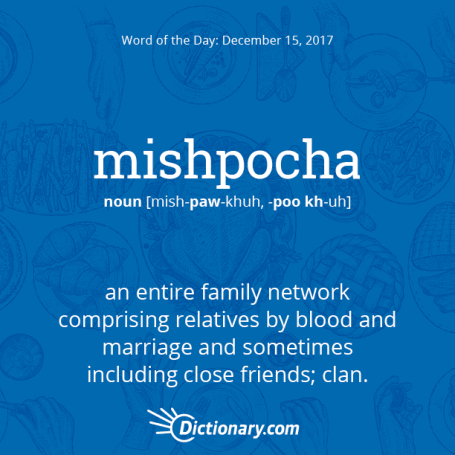
Today’s word of the day at Dictionary.com is mishpocha [mish-paw–khuh, –poo kh–uh]. It is a Yiddish noun that means “an entire family network comprising relatives by blood and marriage and sometimes including close friends; clan” and originates from the Hebrew letter ‘heth’, meaning family, clan. It entered the English language in the mid 19th century.
Did you know the eight-day festival of lights, Hanukkah, started on December 12th this week? In honor of this holiday, a few fun facts:
From the website Chabad.org:
Why is Chanukah (Hanukkah) eight nights long? The Talmud asks and answers:
The sages taught: On the 25th of Kislev, the days of Chanukah are eight. One may not eulogize on them, and one may not fast on them. This is because when the Greeks entered the Sanctuary, they defiled all the oils that were in the Sanctuary. And when the Chashmonean monarchy overcame them and emerged victorious over them, they searched and found only one cruse of oil that remained with the seal of the High Priest. And there was sufficient oil there to light the candelabrum for only one day. A miracle occurred, and they lit the candelabrum from it for eight days. The next year, the sages instituted those days and made them holidays with the recitation of Hallel and prayers of thanksgiving.1
But there’s more. Seven represents all that is found within this world. There are seven days of the week, seven classical planets and seven musical notes. In fact, the world itself was created in seven days.
Then there is the number eight, which represents that which is above, that which does not fit into the neat slots that hold the bits and pieces of our lives. The number eight evokes the transcendent and the G‑dly. Eight is the number of miracles.
And since mishpocha is a Yiddish word, I thought it would be interesting to look at some other popular Yiddish words that have made it into our everyday English conversation from DailyWritingTips.com:
- baleboste
A good homemaker, a woman who’s in charge of her home and will make sure you remember it. - bissel
Or bisl– a little bit. - bubbe
Or bobe. It means Grandmother, and bobeshiis the more affectionate form. Bubele is a similarly affectionate word, though it isn’t in Yiddish dictionaries. - bupkes
Not a word for polite company. Bubkesor bobkes may be related to the Polish word for “beans”, but it really means “goat droppings” or “horse droppings.” It’s often used by American Jews for “trivial, worthless, useless, a ridiculously small amount” – less than nothing, so to speak. “After all the work I did, I got bupkes!” - chutzpah
Or khutspe. Nerve, extreme arrogance, brazen presumption. In English, chutzpahoften connotes courage or confidence, but among Yiddish speakers, it is not a compliment. - feh!
An expression of disgust or disapproval, representative of the sound of spitting. - glitch
Or glitsh. Literally “slip,” “skate,” or “nosedive,” which was the origin of the common American usage as “a minor problem or error.” - gornisht
More polite than bupkes, and also implies a strong sense of nothing; used in phrases such as “gornisht helfn” (beyond help). - goy
A non-Jew, a Gentile. As in Hebrew, one Gentile is a goy, many Gentiles are goyim, the non-Jewish world in general is “the goyim.” Goyishis the adjective form. Putting mayonnaise on a pastrami sandwich is goyish. Putting mayonnaise on a pastrami sandwich on white bread is even more goyish. - kibbitz
In Yiddish, it’s spelled kibets, and it’s related to the Hebrew “kibbutz” or “collective.” But it can also mean verbal joking, which after all is a collective activity. It didn’t originally mean giving unwanted advice about someone else’s game – that’s an American innovation. - klutz
Or better yet, klots. Literally means “a block of wood,” so it’s often used for a dense, clumsy or awkward person. See schlemiel. - kosher
Something that’s acceptable to Orthodox Jews, especially food. Other Jews may also “eat kosher” on some level but are not required to. Food that Orthodox Jews don’t eat – pork, shellfish, etc. – is called traif. An observant Jew might add, “Both pork and shellfish are doubtlessly very tasty. I simply am restricted from eating it.” In English, when you hear something that seems suspicious or shady, you might say, “That doesn’t sound kosher.” - kvetsh
In popular English, kvetchmeans “complain, whine or fret,” but in Yiddish, kvetshliterally means “to press or squeeze,” like a wrong-sized shoe. Reminds you of certain chronic complainers, doesn’t it? But it’s also used on Yiddish web pages for “click” (Click Here). - maven
Pronounced meyven. An expert, often used sarcastically. - Mazel Tov
Or mazltof. Literally “good luck,” (well, literally, “good constellation”) but it’s a congratulation for what just happened, not a hopeful wish for what might happen in the future. When someone gets married or has a child or graduates from college, this is what you say to them. It can also be used sarcastically to mean “it’s about time,” as in “It’s about time you finished school and stopped sponging off your parents.” - mentsh
An honorable, decent person, an authentic person, a person who helps you when you need help. Can be a man, woman or child. - mishegas
Insanity or craziness. A meshugeneris a crazy man. If you want to insult someone, you can ask them, ”Does it hurt to be crazy?” - mishpocheh
Or mishpokheor mishpucha. It means “family,” as in “Relax, you’re mishpocheh. I’ll sell it to you at wholesale.” - nosh
Or nash. To nibble; a light snack, but you won’t be light if you don’t stop noshing. Can also describe plagarism, though not always in a bad sense; you know, picking up little pieces for yourself. - nu
A general word that calls for a reply. It can mean, “So?” “Huh?” “Well?” “What’s up?” or “Hello?” - oy vey
Exclamation of dismay, grief, or exasperation. The phrase “oy vey iz mir” means “Oh, woe is me.” “Oy gevalt!” is like oy vey, but expresses fear, shock or amazement. When you realize you’re about to be hit by a car, this expression would be appropriate. - plotz
Or plats. Literally, to explode, as in aggravation. “Well, don’t plotz!” is similar to “Don’t have a stroke!” or “Don’t have a cow!” Also used in expressions such as, “Oy, am I tired; I just ran the four-minute mile. I could just plotz.” That is, collapse. - shalom
It means “deep peace,” and isn’t that a more meaningful greeting than “Hi, how are ya?” - shlep
To drag, traditionally something you don’t really need; to carry unwillingly. When people “shlep around,” they are dragging themselves, perhaps slouchingly. On vacation, when I’m the one who ends up carrying the heavy suitcase I begged my wife to leave at home, I shlep it. - shlemiel
A clumsy, inept person, similar to a klutz (also a Yiddish word). The kind of person who always spills his soup. - schlock
Cheap, shoddy, or inferior, as in, “I don’t know why I bought this schlocky souvenir.” - shlimazel
Someone with constant bad luck. When the shlemiel spills his soup, he probably spills it on the shlimazel. Fans of the TV sitcom “Laverne and Shirley” remember these two words from the Yiddish-American hopscotch chant that opened each show. - shmendrik
A jerk, a stupid person, popularized in The Last Unicornand Welcome Back Kotter. - shmaltzy
Excessively sentimental, gushing, flattering, over-the-top, corny. This word describes some of Hollywood’s most famous films. From shmaltz, which means chicken fat or grease. - shmooze
Chat, make small talk, converse about nothing in particular. But at Hollywood parties, guests often schmooze with people they want to impress. - schmuck
Often used as an insulting word for a self-made fool, but you shouldn’t use it in polite company at all, since it refers to male anatomy. - spiel
A long, involved sales pitch, as in, “I had to listen to his whole spiel before I found out what he really wanted.” From the German word for play. - shikse
A non-Jewish woman, all too often used derogatorily. It has the connotation of “young and beautiful,” so referring to a man’s Gentile wife or girlfriend as a shiksaimplies that his primary attraction was her good looks. She is possibly blonde. A shagetzor sheygets means a non-Jewish boy, and has the connotation of a someone who is unruly, even violent. - shmutz
Or shmuts. Dirt – a little dirt, not serious grime. If a little boy has shmutz on his face, and he likely will, his mother will quickly wipe it off. It can also mean dirty language. It’s not nice to talk shmutz about shmutz. A current derivation, “schmitzig,” means a “thigamabob” or a “doodad,” but has nothing to do with filth. - shtick
Something you’re known for doing, an entertainer’s routine, an actor’s bit, stage business; a gimmick often done to draw attention to yourself. - tchatchke
Or tshatshke. Knick-knack, little toy, collectible or giftware. It also appears in sentences such as, “My brother divorced his wife for some little tchatchke.” You can figure that one out. - tsuris
Or tsores. Serious troubles, not minor annoyances. Plagues of lice, gnats, flies, locusts, hail, death… now, those were tsuris. - tuches
Rear end, bottom, backside, buttocks. In proper Yiddish, it’s spelled tuchisor tuches or tokhis, and was the origin of the American slang word tush. - yente
Female busybody or gossip. At one time, high-class parents gave this name to their girls (after all, it has the same root as “gentle”), but it gained the Yiddish meaning of “she-devil”. The matchmaker in “Fiddler on the Roof” was named Yente (and she certainly was a yentethough maybe not very high-class), so many people mistakenly think that yente means matchmaker. - yiddisher kop
Smart person. Literally means “Jewish head.” I don’t want to know what goyisher kop
I am not Jewish, so a good deal of this is new to me. It’s also the reason I am a fan of using the generic “Happy Holidays” greeting as opposed to “Merry Christmas”. Actually, I tend to respond in like fashion if anyone wishes me a holiday greeting. This is, after all, a season of light, hope, peace and love. That is the most important thing. That is what matters.
Finally, to my Jewish friends from me…a humble goy, “Chag Urim Sameach!” …“Hanukkah Sameach!” …“Chag Sameach!” – I hope that covers all the bases, respectfully. Light, hope, peace and love all. ❤
it’s time to gather
mishpocha from everywhere
family matters
~kat






December 15th, 2017 at 1:20 pm
Never heard of that word, but I know quite a few in the list and I’m nowhere close to being Jewish! Quite a few of those words have made it into the mainstream. 🙂
LikeLiked by 1 person
December 15th, 2017 at 2:44 pm
Yes. I learned a few new ones too! 😊
LikeLiked by 1 person
December 15th, 2017 at 2:35 pm
I laughed out loud! Good choice of words! You hit the special and expressive ones.😂😂💕
LikeLiked by 1 person
December 15th, 2017 at 2:39 pm
Thank you. I had help, of course, via google. 😊 learned a few new ones!
LikeLiked by 1 person
December 15th, 2017 at 2:52 pm
😍🧐
LikeLike
December 17th, 2017 at 6:05 am
I enjoyed meeting these words- all new to me- thank you.
LikeLiked by 1 person
December 17th, 2017 at 7:46 am
Quite a few of them were new to me too. Yiddish is such a colorful language! 😊
LikeLike